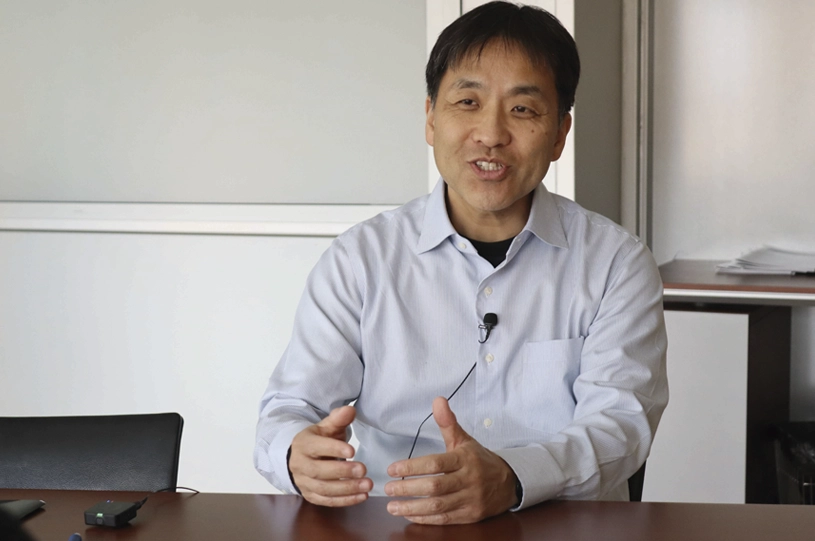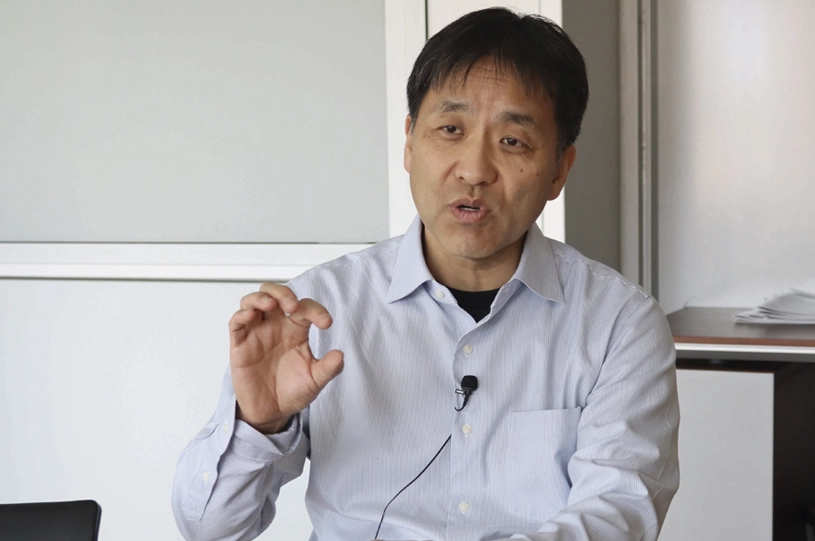Yasuki Fukita: “What I really wanted to do is the fusion of physics and biology”
Kyoto University Graduate School of Medicine, Department of Molecular Oncology

Prof. Yasuyuki Fujita, PhD, from Kyoto University’s Graduate School of Medicine, specializes in how normal epithelial cells eliminate cancer cells through competition. He first conceived this model as a student and later became the first to demonstrate it for normal vs. cancerous epithelial cells in Nature Cell Biology (Hogan et al., 2009). Born in Osaka, he studied medicine at Kyoto University and completed most of his Ph.D. at Osaka University, researching intracellular signaling under Prof. Yoshimi Takai. He then spent five years in Berlin at the Max-Delbrück-Center for Molecular Medicine, where he discovered Hakai, a protein involved in disrupting cell-cell adhesion (Neuron, 1998; Nature Cell Biology, 2002). From 2002 to 2011, he led a group at University College London’s MRC Laboratory for Cell and Molecular Biology, focusing on epithelial cell competition. Since then, he has continued this research at Hokkaido University and, since 2020, at Kyoto University.
What exactly is cell competition?
Cell competition is a process in which cells with different properties compete for survival or space. Often, abnormal, or aberrant cells are identified and eliminated by other cells, maintaining tissue health. This process also plays a role in the early stages of cancer. When oncogenic mutations occur in a single cell, neighboring cells can recognize and eliminate them, acting as a natural cancer-prevention mechanism.
Miguel Torres was the first to demonstrate that cell competition occurs during mouse embryonic development, showing that abnormal cells are eliminated to ensure proper body formation. His 2013 study published in Nature had a significant impact on the field. I started working on cell competition in 2009, and after being impressed by his findings, I invited him to Japan for a talk. Since then, we have maintained a strong connection, discussing cell competition mechanisms despite our different research focuses.
Spain is a strong hub for cell competition research—Ginés Morata, based at a cancer center, first discovered cell competition in Drosophila, making him the “father” of the field. Japan is also advancing rapidly in this area, and today, both countries are at the forefront of cell competition research. We frequently invite Ginés and Miguel to our conferences in Japan, including a major international meeting last summer.
How does cell competition help prevent cancer in our bodies?
Although not yet fully demonstrated, our research using mouse models suggests that when cancerous cells emerge, they can be eliminated through cell competition. This phenomenon is observed across multiple species, including Drosophila and zebrafish, indicating it is a conserved biological mechanism.
We also found that various environmental factors, such as chronic inflammation and high-fat diets, can weaken cell competition. For example, in obese mice, cell competition decreases. This suggests that lifestyle choices may influence our body’s ability to eliminate early-stage cancer cells.
Does this mean our diet and lifestyle can influence how well our healthy cells fight against cancer?
While we do not yet fully understand how cells recognize abnormal ones, this is a major question in the field. Miguel and I are actively investigating potential triggers that enhance or suppress cell competition. We are particularly interested in how environmental conditions influence this process.
Why do some cancer cells evade the immune system while others do not?
The immune system typically responds at later stages of cancer development. In the very early stages, normal cells may act as the first line of defense, eliminating abnormal cells before the immune system is involved. This highlights the potential importance of cell competition as a protective mechanism in early cancer prevention.
How close are we to using your findings to develop cancer treatments?
If we can fully understand the mechanisms behind cell competition, it could be applied to cancer prevention. Our research indicates that a low-glucose diet—achieved through intermittent fasting or a ketogenic diet—can enhance cell competition in mice and promote the elimination of cancer cells. However, we still need more detailed studies to determine how this can be translated into practical applications.
Additionally, we have identified a drug that promotes cell competition, which could be another potential avenue for treatment. While cell competition may not be applicable to advanced malignancies, it could be valuable for early-stage cancer prevention.
Could we one day train healthy cells, like the immune system, to better fight cancer?
That is one of our key goals. Since we know that low glucose promotes cell competition, modifying environmental conditions or cell behavior could enhance our body’s natural defenses against cancer. However, we must first clarify the underlying mechanisms before developing a viable treatment.
Could future treatments involve creating “super healthy cells” through diet, drugs, and lifestyle adjustments?
Advances in genetic sequencing allow us to identify individuals at higher risk for certain cancers, such as pancreatic or colon cancer. In the future, we might tailor interventions to strengthen specific organs’ defenses against cancer. We know that certain individuals may have a higher predisposition to diseases like pancreatic or colon cancer. With the increasing accumulation of sequencing data, it’s possible that in the future, by analyzing DNA, we could gain a deeper understanding of these tendencies. This could guide us in identifying individuals at higher risk for certain cancers, such as pancreatic cancer. In turn, we could explore ways to boost the pancreas’ defense mechanisms to reduce the risk. This kind of tailored approach might become possible as sequencing data continues to advance. However, we are still in the early stages of understanding how to fully utilize this information. One thing we’ve found is that cell competition, which can influence cancer development, behaves differently across tissues. For example, when we compare the lung, intestine, and pancreas, we observe that cell competition is very active in the intestine. But in the lung, cell competition may be less pronounced, and sometimes cells can escape from this competition, potentially leading to tumorigenesis. However, we still don’t fully understand why cell competition occurs differently in various tissues. Understanding why competition differs between tissues is an important area of research.

Immunotherapy is becoming a standard treatment for many cancers. Could it be combined with cell competition research to find a cure?
I’m not entirely sure whether cell competition can be applied to highly malignant cells. What we have shown so far is that cell competition seems to occur at earlier stages of cancer. So, while I’m uncertain if cell competition research could directly lead to cancer treatments, it may offer insights into prevention strategies.
Currently, there are no drugs proven to truly prevent cancer. The closest example is anti-inflammatory drugs, like aspirin, which have been shown to reduce the risk of colon cancer, but that’s about it. So, cancer prevention could be a major focus in the future. Cell competition, in particular, could play a role in such preventive approaches, and that is my ultimate goal.
The biggest challenge is proving that a drug can effectively prevent cancer. Typically, this requires studying large populations—millions of people with and without the drug—to observe long-term outcomes. However, many researchers worldwide are working on developing diagnostics for precancerous conditions. Once these diagnostic tools are available, the effects of cancer-preventive drugs can be scientifically assessed. By monitoring the progression of pre-cancerous cells—whether they evolve into malignant ones or disappear—prevention strategies can be better understood. If such diagnostic methods are developed, we could see significant progress in preventive medicine.
If you had unlimited time and resources, what would you study?
What I really wanted to do, but haven’t yet achieved, is the fusion of physics and biology. My background is in medicine, but I became interested in science when I was around 18 or 19. At that time, I wanted to pursue something revolutionary, something that no one had tried before. I realized that there are three major fields in science: physics, chemistry, and biology. The fusion of chemistry and biology has already been explored, as has the fusion of physics and chemistry. But there hasn’t been as much focus on the fusion of physics and biology.













